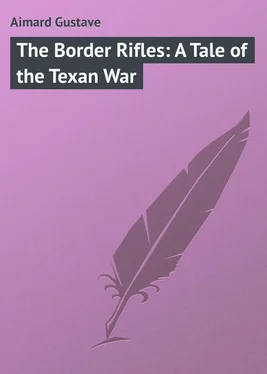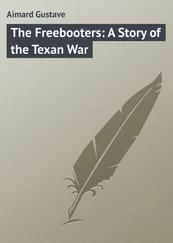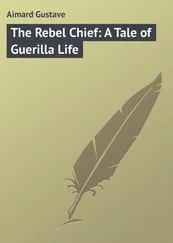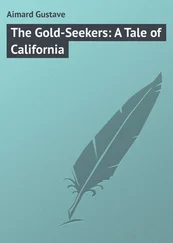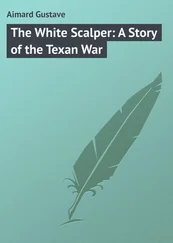Gustave Aimard - The Border Rifles - A Tale of the Texan War
Здесь есть возможность читать онлайн «Gustave Aimard - The Border Rifles - A Tale of the Texan War» — ознакомительный отрывок электронной книги совершенно бесплатно, а после прочтения отрывка купить полную версию. В некоторых случаях можно слушать аудио, скачать через торрент в формате fb2 и присутствует краткое содержание. Жанр: foreign_prose, foreign_adventure, foreign_language, на английском языке. Описание произведения, (предисловие) а так же отзывы посетителей доступны на портале библиотеки ЛибКат.
- Название:The Border Rifles: A Tale of the Texan War
- Автор:
- Жанр:
- Год:неизвестен
- ISBN:нет данных
- Рейтинг книги:5 / 5. Голосов: 1
-
Избранное:Добавить в избранное
- Отзывы:
-
Ваша оценка:
- 100
- 1
- 2
- 3
- 4
- 5
The Border Rifles: A Tale of the Texan War: краткое содержание, описание и аннотация
Предлагаем к чтению аннотацию, описание, краткое содержание или предисловие (зависит от того, что написал сам автор книги «The Border Rifles: A Tale of the Texan War»). Если вы не нашли необходимую информацию о книге — напишите в комментариях, мы постараемся отыскать её.
The Border Rifles: A Tale of the Texan War — читать онлайн ознакомительный отрывок
Ниже представлен текст книги, разбитый по страницам. Система сохранения места последней прочитанной страницы, позволяет с удобством читать онлайн бесплатно книгу «The Border Rifles: A Tale of the Texan War», без необходимости каждый раз заново искать на чём Вы остановились. Поставьте закладку, и сможете в любой момент перейти на страницу, на которой закончили чтение.
Интервал:
Закладка:
His game-bag, of tanned leather, hung over his shoulder, and, like all the bold pioneers of the virgin forest, his weapons consisted of a good Kentucky rifle, a straight-bladed knife, ten inches long and two wide, and a tomahawk that glistened like a mirror. These weapons, of course with the exception of the rifle, were passed through his belt, which also supported two buffalo horns filled with powder and bullets.
The appearance of the man thus equipped, and standing in the canoe amid the imposing scenery that surrounded him, had something grand about it which created an involuntary respect.
The wood-ranger, properly so termed, is one of those numerous types of the New World which must soon entirely disappear before the incessant progress of civilization.
The wood-rangers, those bold explorers of the deserts, in which their whole existence was spent, were men who, impelled by a spirit of independence and an unbridled desire for liberty, shook off all the trammels of society, and who, with no other object than that of living and dying unrestrained by any other will save their own, and in no way impelled by the hope of any sort of lucre, which they despised, abandoned the towns, and boldly buried themselves in the virgin forests, where they lived from day to day indifferent about the present, careless as to the future, convinced that God would not desert them in the hour of need, and thus placed themselves outside of that common law they misunderstood, on the extreme limit that separates barbarism from civilization.
Most of the celebrated wood-rangers were French Canadians; in truth, there is in the Norman character something daring and adventurous, which is well adapted to this mode of life, so full as it is of strange interludes and delicious sensations, whose intoxicating charms only those who have led it can understand.
The Canadians have never admitted in principle the change of nationality which the English tried to impose on them; they still regard themselves as Frenchmen, and their eyes are constantly fixed on that ungrateful mother-country which has abandoned them with such cruel indifference.
Even at the present day, after so many years, the Canadians have still remained French; their fusion with the Anglo-Saxon race is only apparent, and the slightest pretext would suffice to produce a definitive rupture between them and the English. The British government is well, aware of this fact, and hence displays toward the Canadian colonies a marked kindliness and deference.
At the earlier period of the conquest this repulsion (not to call it hatred) was so prominent between the two races, that the Canadians emigrated in a mass, sooner than endure the humiliating yoke which was attempted to be placed on them. Those of them who, too poor to leave their country definitively, were compelled to remain in a country henceforth sullied by a foreign occupation, chose the rude trade of wood-rangers, and preferred such an existence of misery and danger to the disgrace of enduring the laws of a detested conqueror. Shaking the dust over their shoes on the paternal roof, they threw their rifles over their shoulders, and stifling a sigh of regret, went away not to return, burying themselves in the impenetrable forests of Canada, and laying unconsciously the foundation of that generation of intrepid pioneers, to one of the finest specimens of whom we introduced the reader at the beginning of this chapter.
The hunter went on paddling vigorously; he soon reached the first flamingo, which he threw into the bottom of his canoe. But the second gave him more trouble. It was for a while a struggle of speed between the wounded bird and the hunter: still the former gradually lost its strength; its movements became uncertain, and it beat the water convulsively. A blow from the Canadian's paddle at length put an end to its agony, and it joined its mate in the bottom of the canoe.
So soon as he had secured his game, the hunter shipped his paddles, and prepared to reload his rifle, with the care which all devote to the operation who know that their life depends on a charge of powder. When his gun was in order again, the Canadian took an inquiring glance around.
"Why," he presently said, talking to himself, a habit which men who live in solitude very frequently acquire, "hang me! if I have not reached the meeting-place without suspecting it. I cannot be mistaken: over there are the two oaks fallen across each other, and that rock, which stands out over the water. But what's that?" he exclaimed, as he stooped, and cocked his rifle.
The furious barking of several dogs became suddenly audible in the centre of the forest; the bushes were parted eagerly, and a Negro appeared on the top of the rock, at which the Canadian was at this moment looking. This man, on reaching the extremity of the rock, stopped for an instant, and seemed to listen attentively, while displaying signs of the most extreme agitation. But this halt was short, for he had hardly rested there for a few seconds, ere, raising his eyes to heaven in despair, he leaped into the river, and swam vigorously to the opposite bank.
The sound of the Negro's fall into the water had hardly died away, when several dogs dashed on to the platform, and began a concert of horrible barking. These dogs were powerful animals; their tongues were pendant, their eyes infested with blood, and their hair standing on end, as if they had come a long distance.
The hunter shook his head several times while giving a glance of pity at the hapless Negro, who was swimming with that energy of despair which doubles the strength – and seizing his paddles, he turned the canoe toward him, with the evident intention of rendering him assistance. At this moment a hoarse voice was heard on the river-bank.
"Hilloh, there! silence, you demons incarnate! silence, I tell you!"
The dogs gave vent to a few whines of pain, and were suddenly silent. The individual who had reproved the animals then said, in a louder key —
"Hilloh, you fellow in the canoe there! – hilloh!"
The Canadian had just pulled to the opposite bank; he ran his canoe on the sand, and then carelessly turned to the person who addressed him.
This was a man of middle height, muscular, and dressed like the majority of rich farmers. His face was brutal, crafty, and four persons, apparently servants, stood by his side; it is needless to say that all were armed with guns.
The stream at this spot was rather wide, being about fifty yards, which, temporarily, at any rate, established a respectable barrier between the Negro and his pursuers. The Canadian leaned against a tree.
"Are you by chance speaking to me?" he asked, in a somewhat contemptuous tone.
"Who else do you suppose?" the first speaker continued, angrily: "so try and answer my questions!"
"And why should I answer them? Will you be good enough to tell me?" the Canadian continued, with a laugh.
"Because I order you to do so, you scoundrel!" the other said, brutally.
The hunter shrugged his shoulders disdainfully.
"Good-bye," he said, and made a movement as if to retire.
"Stop where you are!" the American shouted, "or so truly as my name is John Davis I will put a bullet through your skull!"
While uttering the threat he levelled his gun.
"Ah! ah!" the Canadian went on, with a laugh, "then you're John Davis, the famous slave-dealer?"
"Yes, I am," the other said, harshly.
"Pardon me; but I had hitherto only known you by reputation. By Jove! I am delighted to have seen you."
"Well, and now that you know me, are you disposed to answer my questions?"
"I must know their nature first, so you had better ask them."
"What has become of my slave?"
"Do you mean the man who leaped off the platform just before you reached it?"
"Yes. Where is he?"
Читать дальшеИнтервал:
Закладка:
Похожие книги на «The Border Rifles: A Tale of the Texan War»
Представляем Вашему вниманию похожие книги на «The Border Rifles: A Tale of the Texan War» списком для выбора. Мы отобрали схожую по названию и смыслу литературу в надежде предоставить читателям больше вариантов отыскать новые, интересные, ещё непрочитанные произведения.
Обсуждение, отзывы о книге «The Border Rifles: A Tale of the Texan War» и просто собственные мнения читателей. Оставьте ваши комментарии, напишите, что Вы думаете о произведении, его смысле или главных героях. Укажите что конкретно понравилось, а что нет, и почему Вы так считаете.
